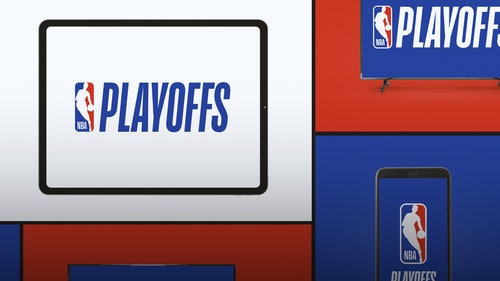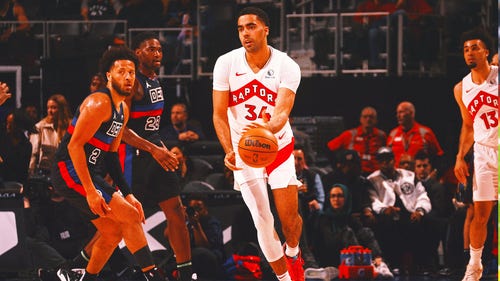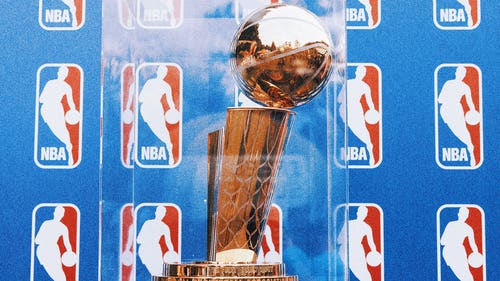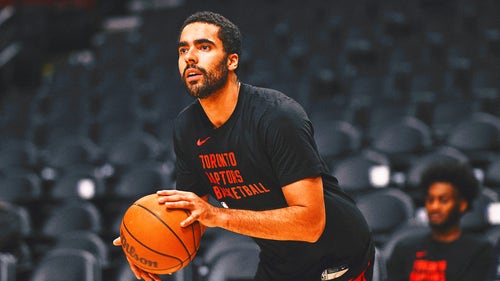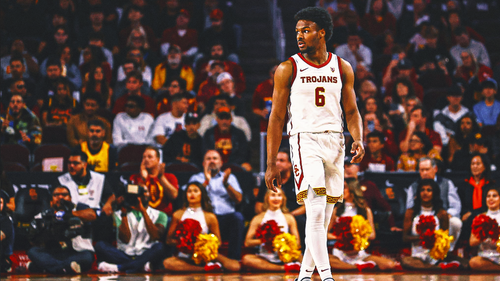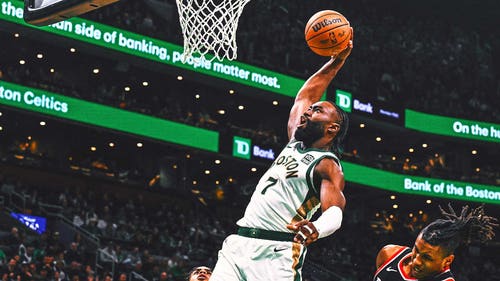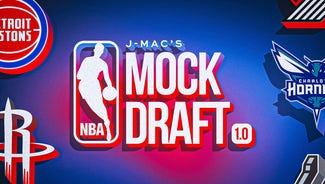
Are The Current Raptors Headed For Extinction?
There was a long list of reasons to praise Masai Ujiri’s trade deadline acquisitions of Serge Ibaka and P.J. Tucker, two veteran players who filled major positional needs, addressed glaring defensive weaknesses, arrived at a reasonable price, and carried expiring contracts. But in the wake of Toronto’s humbling, borderline humiliating, second-round sweep at the hands of Cleveland, a hidden benefit to the moves has risen to the surface: Ujiri, Toronto’s successful and well-liked executive, is beholden to no one as he works through the delicate and expensive process of crafting the next iteration of the Raptors.
To Kyle Lowry and DeMar DeRozan, who pined for “change” and “help” in February, Ujiri can say he delivered just that, giving the star guards their best supporting cast yet. To coach Dwane Casey, Ujiri can say he delivered versatility and experience to a frontcourt that badly needed both. To everyone, from ownership to Casey to his All-Stars and to the fans, Ujiri can point to his deadline moves and claim, reasonably, that he “went for it.” Ujiri added more to his roster at the deadline, on paper, than any of the contenders and wanna-be contenders in either conference. The former Executive of the Year did right by Lowry (in a contract year), DeRozan (in a career year) and Casey (on a perpetually hot seat). His moves ultimately didn’t work out because Lowry got hurt, DeRozan proved underqualified and too inconsistent to pick up the slack, and Casey couldn’t find a way to stop the bleeding against a superior opponent led by one of the greatest players in NBA history.
That LeBron James and the Cavaliers wiped the floor with the souped-up Raptors—toying with them at every turn—gives Ujiri every right to cheap out on paying Lowry, trade DeRozan for assets, and part ways with Casey. Nothing screams “Change for the sake of change!” like watching Lowry sidelined yet again, DeRozan making exactly one three-pointer in 373 postseason minutes, Casey making debatable lineup decisions with his use of center Jonas Valanciunas and Tucker, and James mock-drinking a beer during a second-round game out of self-assured superiority. It’s hard not to want an overhaul when the central figures are taking turns bathing in hopelessness, with Lowry telling Yahoo Sports that “nobody is closing the gap on LeBron,” when DeRozan is offering “100 dollars” for anyone who can stop James, and when Casey is lamenting how “the game is changing” to favor more explosive offenses.

Nevertheless, Ujiri’s track record suggests that this summer might not be quite that dramatic once the dust settles. For starters, the defining quality of an Ujiri team is that it is a respectable product. After taking over the Nuggets in 2010, Ujiri guided the franchise to three straight playoff trips despite trading away franchise forward Carmelo Anthony. Since he’s arrived in Toronto, Ujiri has overseen four consecutive playoff trips highlighted by the organization’s first trip to the East finals and a franchise-record 56 wins. As the head guy, Ujiri is 7-for-7 in delivering his organizations to the postseason. What’s more, Toronto has accumulated more combined wins over the last four regular seasons (204) than any other franchise in the East. The Raptors might not have had a prayer in pushing James over the last two weeks, but they have been the conference’s winningest organization since Ujiri arrived in 2013. “It’s hard to break down a team that’s won 50 games two years in a row,” DeRozan astutely noted following Game 4.

The best predictor of future action is past behavior, and nothing about Ujiri’s runs in Denver or Toronto suggests that he’s likely to race headfirst into a total rebuild. Why would an executive in his position bring an end to the golden era of Raptors hoops unless his hand was forced? The shrieks of panic from the excitable minds who treat “We the North” as a nationalistic battle cry and truly believe DeRozan is underrated rather than overrated will pass soon enough, and they will want a winning team to cheer for in 2017-18. Since when has Ujiri, the sometimes-profane ringleader of Jurassic Park, wanted to let them down?
If the goal becomes respectability rather than contention—and it has given the events of the last two weeks and the insane price tag that would be required to keep the entire band together—Ujiri can get there without that much heavy lifting. Lowry is 31 and in search of the first massive pay day of his career. Ujiri can offer him more money and years than anyone else, knowing that if a clueless sucker like the Knicks will trade for 2013 Andrea Bargnani and Derrick Rose in 2016 then they’ll trade for Lowry in 2019 if necessary. DeRozan is already locked in for the long term and at this point he’s worth more to the Raptors than any other team given his popularity, the clear holes in his game and his huge salary number.

Retaining those two stars together should be enough to keep the Raptors afloat, as the presence of six low-cost contributors (Jakob Poeltl, Bebe Nogueira, Delon Wright, Pascal Siakam, Norm Powell and Fred VanVleet) plus a 2017 first-round pick goes a long way to offsetting the massive salary cap commitments the stars will require. Not every organization is this well-equipped to field a winner with a top-heavy cap sheet dominated by two max-level players.
In a best-case scenario, Ujiri moves 2016-2017 underperformers like DeMarre Carroll or Cory Joseph while keeping Tucker, who should be a priority given Toronto’s need for a perimeter defender to complement its lead guards. In a worst-case scenario, Toronto gets stuck with its expensive holdovers and both Ibaka and Tucker prove to be too costly, undercutting the roster’s depth. Either way, Lowry’s return—even at a max number that makes one blush and squirm—keeps the Raptors in the mix. His departure, given the lack of available internal candidates and the difficulty in affording a needle-mover in free agency, would be a major setback and one that’s difficult to see Ujiri stomaching without a major effort.
If push comes to shove and pennies need to be pinched, the playoffs proved that Ibaka has become expendable. While he makes more sense on paper than Valanciunas, a traditional center who struggles to match-up with stretch bigs, Ibaka did not prove to be indispensable after the deadline. Toronto’s defensive rating was worse with him on the court in both the regular season and the playoffs, and his timely exit from the going-nowhere Magic did not truly reverse his decline. Despite the worthwhile cheers that greeted his arrival, no tears should be shed if he departs come July. Ujiri has plugged his power forward hole with the likes of Patrick Patterson, Luis Scola and Siakam in the past, and he can surely go trawling for another budget placeholder to get by if needed.
The simplest method for Ujiri to sell change, then, is to move on from Casey, the longest-tenured coach in Raptors history. While some diehards might disagree, Casey wasn’t guilty of any fireable offenses this season, even though Toronto won fewer games, exited the playoffs earlier, and was swept out to boot. The coach’s defenders would rightfully point out that the Raptors stayed afloat despite an extended absence from Lowry and pulled themselves out of an early first-round hole against the Bucks. He was “better late than never” in shifting Valanciunas to the bench in the playoffs, but he was also thoroughly outgunned. Casey, for his part, stubbornly and admirably told reporters that he felt the Raptors are “knocking on the door” and that he wished he had more time to weave together his midseason additions.
But there’s a case to be made for a coaching change: the Raptors’ stars did more than their share of grousing this season, Lowry and DeRozan both ranked in the top 13 in minutes per game, Toronto ranked 30th in assist rate and 20th in three-point attempts in the “Pace and Space” era, and Casey’s continued presence might be perceived as settling if the bulk of the current core returns. A coaching change could help institute a less demanding playing time load for Lowry and DeRozan, while also easing the natural tension that arises whenever a retooling organization turns over a larger chunk of the rotation minutes to younger players.
The most important thing to remember when it comes to Ujiri is that his most memorable actions—including his many successful trades, his bombastic “F--- Brooklyn” shout, and even his high-profile misses like Carroll—continue to appear calculated years after the fact. There will be new faces on the roster next season, and perhaps a new head man on the sideline, but Ujiri generally prefers a scalpel to dynamite, he doesn’t panic, and he likes to win. James’s brilliance and the business of basketball will ensure that Toronto can’t maintain its status quo, but Ujiri’s history suggests that the off–season will most likely unfold in a logical and methodical fashion.









































































































































